Too many Google Adwords accounts are set up to lose cash. They have no structure, no meaning, and are usually a mess. Every time that happens, it’s a hole that continuously drains you off your ad budget. It makes you believe that you are spending for nothing.
It’s a nightmare, a hell-hole, and obviously a certain path to an unmitigated disaster. To Setup Adwords Account isn’t as obvious as it might seem,depending on how experienced you are with it.
Just don’t buy into the notion that “you know what you are doing”. You’d be surprised to know that many Google Partner agencies and PPC agencies don’t get it right.
Basics: The Structure
Almost always, no matter what business you are in and regardless of the campaign you are going to launch, you just can’t miss a few basics. First, stop picking Google’s default settings.
Google’s default settings are crafted to make “Google” money (and for them, it works). As a business looking to milk Google for its worth, you have to engage in a play with Google where there’s a battle for the dollar.
You want to spend as low as possible to get you maximum returns. So, this is how you start:
Use the Right keyword Modifiers
There’s a never ending debate on what kind of keyword modifiers work best for your campaigns? Some swear by exact match and phrase match while mostly writing off broad match.
The trouble is that keywords specifically and with Google Ad Words campaigns, you can’t sit on extremes.
On the other hand, you can experiment. You can test, but with the catch that you’d always base your decisions based on data. Meanwhile, don’t be too quick to write off anything “that doesn’t work”. Novah Hopkins of WordStream writes:
Broad Match. Nothing splits the room quite like this match-type and the implications of using it. The very definition of broad match (the match type designed to bring in the broadest possible audience) means there will be divide.
On the one hand, nothing brings in the impressions like broad match – if the keyword is in the query, regardless of the context, your ad can be triggered. On the other hand, ad impressions that don’t match the intent of the search query bring down your CTR, which ultimately cause your cost per click to rise.
Meanwhile, John Gagnon of Search Engine Watch points out that for Bing Ads, broad match keywords get 70% more clicks and 56% more conversions than exact match.
What really works for you depends on your propensity to test and take meaningful decisions.
As Perry Marshall writes in his book The Ultimate Guide to Google AdWords, it’s always best to start with a few keywords with Phrase Match and Exact match only. You can always go for broad match when you have the budget to spare.
Search Networks? Display? What?
When you are just about to setup a campaign, you get an option to whether or not you’d like to include Google’s search Partner Network — a huge cluster of partner search engines and other properties Google owns or is associated with. Andy Taylor of Search Engine Land wrote a great post on his take on what you ought to do with this choice.
Display network campaigns should always stand on their own (this is a different beast compared to search and your audience behaves differently).
Geography? Scheduling? Ad Delivery?
Always start small and go with the immediate market that’s of relevance to you.
For local ads, we don’t even need to write about it but for national and global businesses, you should always build up on your campaigns: from local to national and then to global (in that order).
If you are low on budget, opt for scheduled standard delivery where you can specify days of the week and time blocks for your ad to show (while shutting them off for the rest of the time).
Accelerated delivery makes sense for time-sensitive offers, events, etc.
Show ads that are more likely to be clicked?
At fetchprofits, we are big on testing. We lead our campaigns with data-driven decisions. We don’t want Google to do any kind of thinking for us. In that sense, we always pick “Rotate evenly” as the option because we like to test out ads over periods of time.
This is a good habit, but it calls for an added habit of keeping a hawks eye on your campaign.
Keywords, Ad Groups, and Ads
The best Ad Words campiagns are thematic in nature. Keywords of a particular theme are grouped together as keywords.
For our “rebelpreneur” brand, we launched campaigns to drive registrations for our freelancing course.
For this example, we’d set up an adgroup called “Work From Home” and use only keywords with “Work From Home” in them. All set up as Exact Match and Phrase Match.
The ads, meanwhile, look like this, in pairs of two (for testing):
Those ads will be tested over time to find the best ads that perform.
Landing Pages
If there’s an ad, it should point to a landing page. Not to a home page. Not even to a landing page that’s designed like a home page or a home page that’s designed like a landing page.
Websites and other pages designed with navigation, lots of content, graphics, and links have a low “attention ratio” as Oli Gardner of Unbounce puts it.
Don’t ever launch a campaign without landing pages. When you do use a tool like Unbounce, for instance, A/B testing of landing pages allows you to see which landing page version works better than the other.
Here’s an example (from a recently launched campaign):
As with any paid advertising,take the time out to setup Google Adwords account. Make sure you have all the moving parts working, and test every aspect of the entire campaign.
It’s your money. I can bet you don’t want to pay Google’s “Stupidity Tax”. Do you?
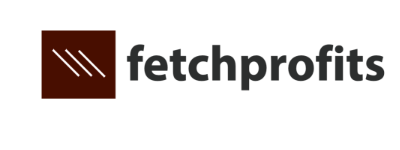
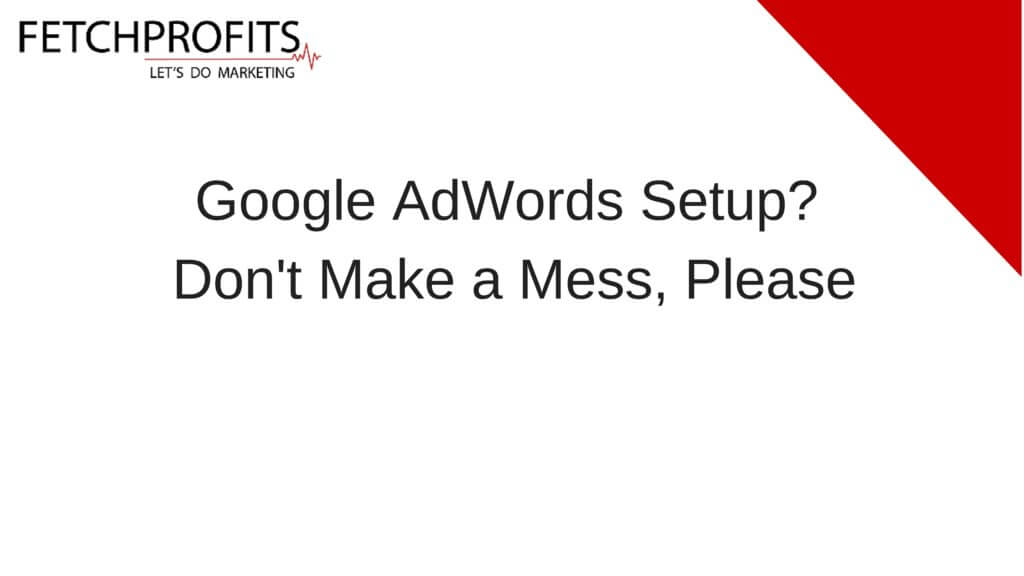
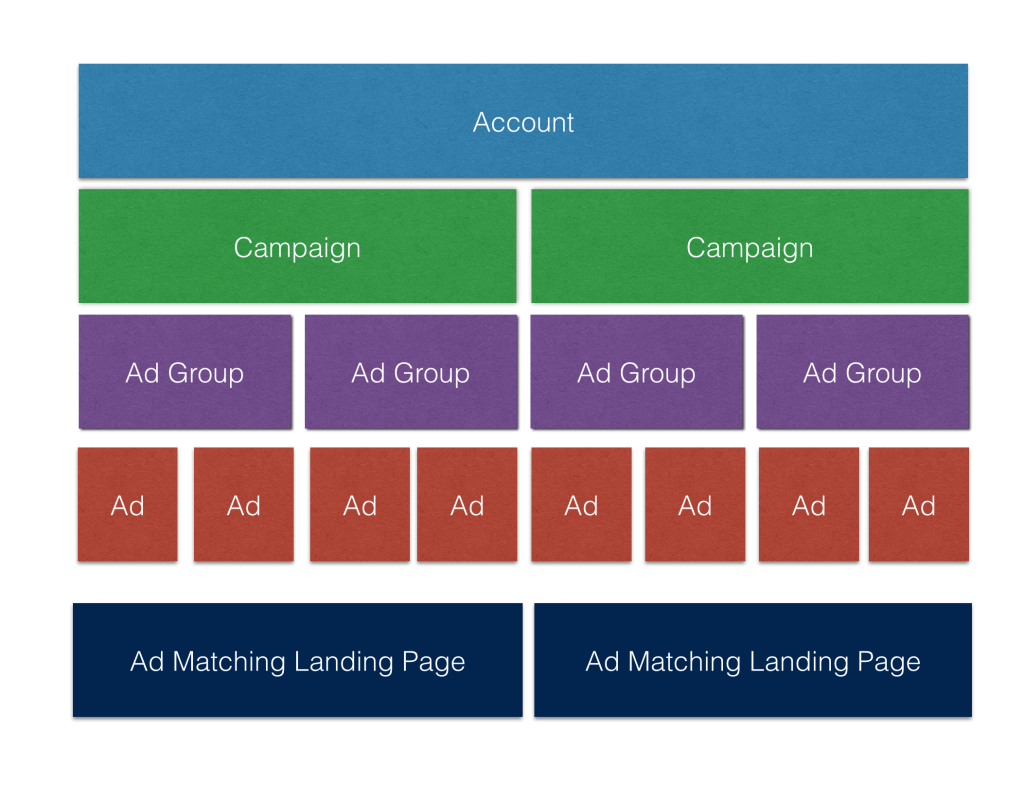
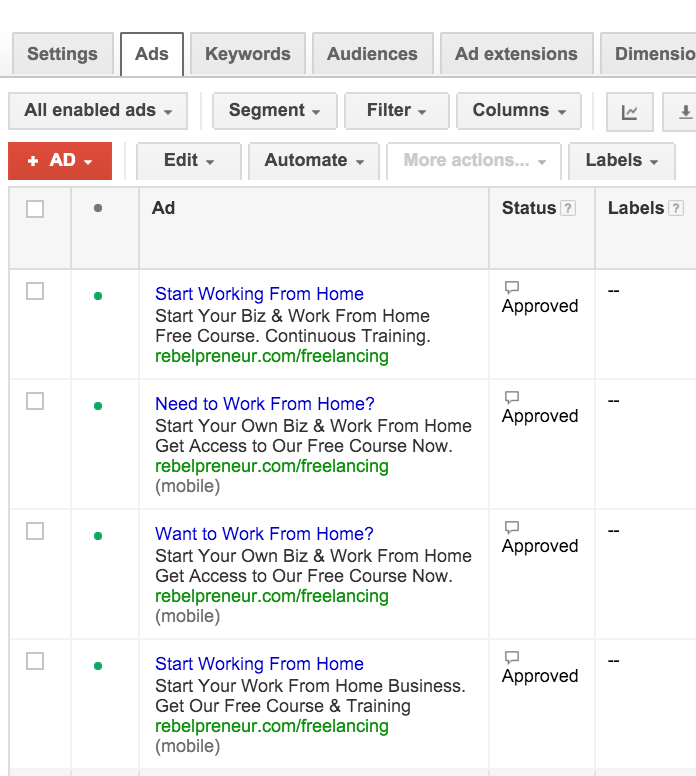
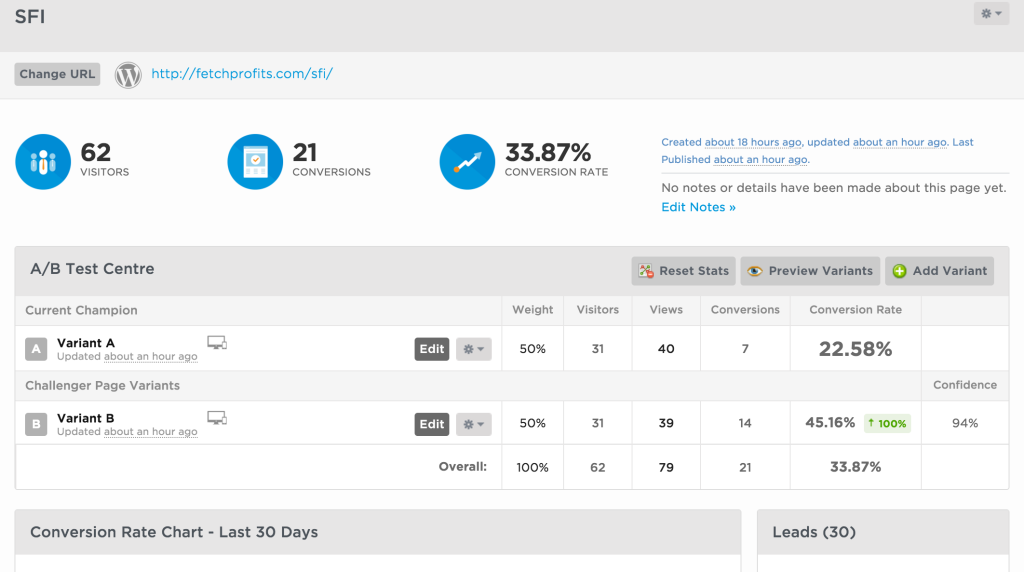
Trackbacks/Pingbacks